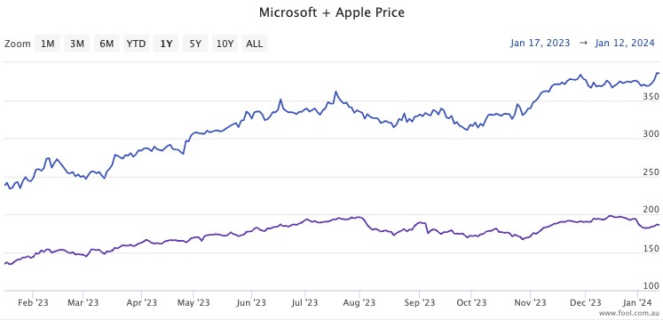Tuesday morning was a historic moment in stock markets as long-time leader Apple Inc (NASDAQ: AAPL) was knocked off the perch as the world's largest company by market capitalisation.
CMC Invest shows that fellow NASDAQ-100 Index (NASDAQ: NDX) giant Microsoft Corp (NASDAQ: MSFT) now has a market cap of US$2.887 trillion, eclipsing Apple's US$2.875 trillion.
It seems Microsoft's stake in OpenAI, which started an artificial intelligence (AI) revolution upon its public release 14 months ago, has encouraged investors to flock to the almost 49-year old company.

Over the past year, the Microsoft share price — and therefore market cap — has rocketed more than 61%.
Apple shares have risen 37% over the same period, while the Nasdaq-100 index has climbed 46%.
According to Bloomberg, this is the first time since November 2021 that Microsoft has been more valuable than Apple.
This Nasdaq stock is a classic 'compounder'
For Montaka Global Investments portfolio manager Chris Demasi, Microsoft is the type of stock he calls "compounders".
"A compounder is an established winner that can continue to grow its business value at superior rates for a long period of time," Demasi said on the Montaka blog in November.
"Compounders typically earn high returns on capital, especially incremental capital invested, and grow their earnings and cash flows quickly."
These stocks, often in the NASDAQ, are bread-and-butter for Montaka's portfolio.
"Compounders can generate very large payoffs over very long periods, which means the return potential is very high, which can have an outsized impact on overall portfolio performance for many years."
And Microsoft is "a quintessential compounder", Demasi added, and it's not even about AI.
"Microsoft has been able to capitalise on the transition to the cloud in two different ways with their Azure cloud computing platform, but also the business productivity applications through Microsoft Office and Teams that are offered in the cloud now."
One downside for Apple in the past year has been China's struggling economy.
Sales for the iPhone, especially, are facing tougher competition from cheaper local handsets in the world's most populous nation.









